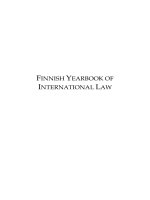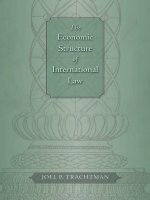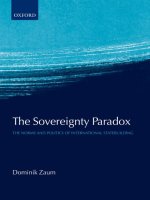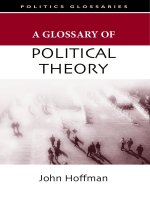edinburgh university press philosophy of international law mar 2007
Bạn đang xem bản rút gọn của tài liệu. Xem và tải ngay bản đầy đủ của tài liệu tại đây (922.94 KB, 272 trang )
ANTHONY CARTY
A fundamental challenge to the foundations
of the discipline of international law.
This book offers an internal critique of the
discipline of international law whilst showing
the necessary place for philosophy within this
subject area. By reintroducing philosophy into
the heart of the study of international law,
Anthony Carty explains how traditionally
philosophy has always been an integral part of
the discipline. However, this has been driven
out by legal positivism, which has, in turn,
become a pure technique of law. He explores
the extent of the disintegration and confusion
in the discipline and offers various ways of
renewing philosophical practice.
A range of approaches are covered – post-
structuralism, neo-Marxist geopolitics, social-
democratic constitutional theory and
existential phenomenology – encouraging the
reader to think afresh about how far to bring
order to, or find order in, contemporary
international society.
Key Features
• Offers a broad survey of possible
philosophical approaches to international
law
• Provides a fundamental critique of the basic
techniques of the international lawyer
• Includes case studies of colonial style
interventions, the problem of American
Empire and a vision of the shape of post-
imperial, post-colonial world society
Anthony Carty is Professor of Public Law at the
University of Aberdeen.
Jacket design: River Design, Edinburgh
Jacket image: Kurt Hutton/Hulton Archive/
Getty Images
Shawcross at the Hague Court in 1948: ‘[ . . . ]
Parties to litigation are not entitled to use
merely those documents which they think will
assist their case and to suppress others which
are inimical to it. [ . . . ] As it is, we retain great
misgivings about the propriety of what is being
done, which we can only justify on the
principle “my country [ . . . ] right or wrong my
country”.’
Hartley Shawcross to Prime Minister,
3 November 1948,
The Corfu Channel Case
Edinburgh University Press
22 George Square
Edinburgh EH8 9LF
www.eup.ed.ac.uk
ISBN 978 0 7486 2255 9
Edinburgh
barcode
Philosophy of
International Law
Philosophy of International Law
ANTHONY CARTY
ANTHONY CARTY
Philosophy of
International Law
PHILOSOPHY OF INTERNATIONAL LAW
M637 CARTY PRE M/UP.qxd 16/1/07 9:45 AM Page i Gary Gary's G4:Users:Gary:Public:Gary's Jobs
To the Memory of my Parents
M637 CARTY PRE M/UP.qxd 16/1/07 9:45 AM Page ii Gary Gary's G4:Users:Gary:Public:Gary's Job
Philosophy of
International Law
Anthony Carty
Edinburgh University Press
M637 CARTY PRE M/UP.qxd 16/1/07 9:45 AM Page iii Gary Gary's G4:Users:Gary:Public:Gary's Jo
© Anthony Carty, 2007
Edinburgh University Press Ltd
22 George Square, Edinburgh
Typeset in Adobe Sabon
by Servis Filmsetting Ltd, Manchester, and
printed and bound in Great Britain by
Biddles Ltd, King’s Lynn, Norfolk
A CIP record for this book is available from the British Library
ISBN 978 0 7486 2255 9 (hardback)
The right of Anthony Carty
to be identified as the author of this work
has been asserted in accordance with
the Copyright, Designs and Patents Act 1988.
M637 CARTY PRE M/UP.qxd 16/1/07 9:45 AM Page iv Gary Gary's G4:Users:Gary:Public:Gary's Job
CONTENTS
Preface and Acknowledgments vi
1What Place for Doctrine in a Time of Fragmentation? 1
2 Continuing Uncertainty in the Mainstream 26
3 International Legal Personality 79
4 The Use of Force 110
5American Legal Cultures of Collective Security 140
6 Marxism and International Law 163
7Resistances to the Neoliberal International
Economic Order 193
8From an Order of Fear to One of Respect 221
Index 249
M637 CARTY PRE M/UP.qxd 16/1/07 9:45 AM Page v Gary Gary's G4:Users:Gary:Public:Gary's Jobs
PREFACE AND ACKNOWLEDGMENTS
Normally a preface will give a list of the names of friends who have
taken the trouble to read drafts of the manuscript, but I have found
myself spontaneously adopting a slightly different and, I believe,
more rigorous course. In the final stages of writing, over the last two
years or so, I have accepted offers to participate in workshops where
I could attempt a dry run of my ideas. As a consequence the work has
had considerable feedback, but a price of participation is that versions
of parts of the work have been published or are being published.
This book is in a remote sense a sequel to The Decay of
International Law published by Manchester University Press in 1986.
It takes up some of the themes of the first book: the contested role of
legal doctrine, the problematic character of custom as a source of law,
and the relationship of the state to the nation in the theory of inter-
national legal personality. However, on this occasion attention is
devoted less to a critique of international lawyers and more to a
rethinking of the tasks an international lawyer might undertake.
There is here a real effort to break free of what I regard as irrelevant
categories of thinking, although this always carries with it the risk
that the discipline no longer recognizes what one is doing and reacts
rather forcefully – this is what I mean by feedback.
For instance, I presented the first fifteen pages of Chapter 1 of the
present book at a conference of French and Spanish international
lawyers at Palma, Majorca, in May 2005.
1
The somewhat outraged
response to my views can be understood, at least in part, by the sense,
especially marked among continental international lawyers, that they
are legal technicians and should not be expected to assume a creative
intellectual role, which implies political and moral responsibilities.
2
Indeed, the view of the international lawyer as a thinker or intellec-
tual is regarded as subversive and even dangerous, no matter how
innocuous his message, precisely because it does not find its way into
a recognizable technical path.
3
And this is the reaction of quite close
and sympathetic friends and colleagues, such as Pierre-Marie Dupuy
M637 CARTY PRE M/UP.qxd 16/1/07 9:45 AM Page vi Gary Gary's G4:Users:Gary:Public:Gary's Job
and Karel Wellens. The marriage of philosophy and international law,
so evident to Vitoria, Suárez, Grotius, and Pufendorf, is now quite
firmly not to be revived. It is even presumptuous to attempt it, a for-
getting of the modest place that belongs to the international legal
technician.
The Decay of International Law met with very supportive reviews
from David Kennedy and Peter Goodrich, which may have led to my
being identified as a critical legal theorist, given the immense author-
ity of these figures in the critical canon. This is very honorable
company. However, there are a number of important respects in
which I am, for better or worse, distinguishable from the Critical
School. For instance, there is a history behind Chapter 6 of the book,
which was first presented as part of a colloquium in the Hague
Residence of Leiden University in September 2003.
4
At this seminar,
organized by Susan Marks and Miklos Redner, there was a passion-
ate debate between my friend and colleague Martti Koskenniemi and
me, about my antiquated ‘’60s Leftism,’ which it is true postmodern
critical legal scholars have mostly left behind.
5
Indeed the works of
Foucault and Baudrillard are premised on the collapse of the Left
after 1968. I very much sympathize with this fact.
6
However, I believe
nothing has changed in the socio-economic conditions of the world,
which justified the original reformist zeal of the Left, and this chapter
is a passionate, if unfashionable manifesto against the abandonment
of the wider socio-economic picture. It has a ‘’60s’ anti-American
tone, which is ‘uncool,’ a point to which I will return later.
A further ‘uncool’ aspect of my work, which is evident in
Chapter 6, is my belief in the right to self-determination of small
nations. Indeed, their right to form states is still the best chance they
have to organize and protect themselves in the face of globalization –
a thoroughly modernist idea. There is hardly a series of propositions
that could be more unfashionable in postmodern critical legal circles.
I have been struggling with the idea of the apparent priority of states
over nations in international law discourse for many years and pieces
of my argument in Chapters 3 and 7 have appeared before.
7
My
approach is not at all influenced by the desire to accommodate liberal
political theory, which I consider very briefly in Chapter 7. Instead,
my aim here is merely to show the relative backwardness historically
of the idea of the state in relation to the idea of the nation. The latter
idea represents a democratic advance and epistemological progress. It
is only the most deplorable stepmotherly meanness of the discipline
of international law which leads it to set so many hurdles in the way
Preface and Acknowledgments vii
M637 CARTY PRE M/UP.qxd 16/1/07 9:45 AM Page vii Gary Gary's G4:Users:Gary:Public:Gary's Jo
of the free expression of peoples. No new nation should have to
explain itself to self-styled liberal opinion in the old Western
European or North American nations, whether in its positivist or its
postmodern mood.
Another ‘uncool’ feature will appear to be the book’s ‘anti-
American’ tone, especially in Chapter 5, ‘American Legal Cultures
’. I think this chapter is a rather standard exercise in postmodern
cultural critique, an immanent critique of American discourse, based
almost entirely on quite conservative American sources, particular
Protestant American theological writing and classical American his-
toriography. However, when I presented substantially the same paper
at an international seminar in Innsbruck, organized by Hans
Koechler, some European reactions evidenced unease at possible
scapegoating of one country.
8
For myself there is the question of
accepting responsibility as an international lawyer to confront actual
problems. The US has been until the present the leading country to
accept responsibility for the maintenance of international order.
Critical reflection on American practice has to be central to what an
international lawyer does. In the appendix to Chapter 4, I consider
the postmodern lethargy of Europe when it comes to accepting such
responsibility, and one sees it again at the time of writing in the initial
reluctance of Europeans to contribute effectively to peacekeeping in
Lebanon in August 2006. This reluctance is now changing and it may
be that the anemic mood in Europe is becoming a thing of the past.
Koechler’s forum in Innsbruck was in any case free of the Chekhovian
quality of much continental European international law debate.
Nonetheless, there is one fundamental sense in which I think this
work remains profoundly critical, indeed postmodern and that is my
final insistence upon a plurality of methods for undertaking inter-
national law as an intellectual task in which the only sovereign the
jurist should recognize is his or her own intellectual conscience. If
statesmen want their treaties and judges want their decisions to be
analyzed and expounded, they can hire their own officials to do it for
them. Such exercises are useful, but they are no more than what I call
legal dogmatics in Chapter 1 of the book. What still needs to be done
is precisely to indulge one’s search for the foundations of one’s own
legitimacy, which obviously cannot be found in the terms of Article
38(1)(d) of the Statute of the International Court of Justice. It merely
allows that the views of distinguished jurists could be evidence of the
existence of rules of international law. A renewed role for doctrine
must at present lead the international lawyer in search of intellectual
viii Philosophy of International Law
M637 CARTY PRE M/UP.qxd 16/1/07 9:45 AM Page viii Gary Gary's G4:Users:Gary:Public:Gary's J
tasks, which his colleagues will not recognize as legal. In that case the
struggle is to see who can finally appropriate the title ‘legal.’ In my
view there is much more to do than to provide analytical indexes
of treaties and judicial decisions. I believe that in Chapters 7 and 8
I merely recall the wider role that doctrine had until Vattel. As I was
finishing this book, I was approached by a young international rela-
tions scholar, Daniel Joyce, to make a contribution to a symposium
on ‘Fear and International Order.’
9
This appeared as a direct chal-
lenge from a student of international relations to test the most radical
chapter of the book at the hands of anonymous peer reviewers from
that discipline. The feedback was very favorable. I believe this experi-
ence is confirmation that the audience I am trying to address in the
concluding two chapters has to be this wider one of quite simply
humanist scholarship, not marked by any particular discipline.
In his contribution to Law after Ground Zero, Bill Bowring quotes
at length from the Decay of International Law. However, he goes on
to prefer the expression used by David Chandler, a political scientist,
as the title of his own chapter, ‘The Degradation of International
Law?’ International law is no longer accepted by Western powers as
a curb on the use of force. They prefer to appeal to what they call
international justice, leading thereby to the degradation, not the
development, of international law.
10
There is a crisis of acceptance of
international law, which is not confined to a few restless, ‘postmod-
ern’ legal spirits, but belongs to the widespread refusal of any place
for international law in world society. International lawyers have to
address this society, which they cannot simply do through authori-
tarian appeals to their own legal dogmatics. They have to find a lan-
guage, which others can speak. Indeed the point of the title of this
book, Philosophy of International Law, is that they have to learn to
use many languages.
While I have been completing this book, I have also been working
on another, an analysis of the form of legal advising, which takes
place in departments of the British government when it is making
foreign policy decisions. The logic of such work is quite different from
this book. It endeavors to be purely positivist historical research, as
far as that is possible in the practice of history. However, underlying
such work is the wish to set standards for international legal posi-
tivism which I think it does not set itself. International legal posi-
tivism, insofar as it is not merely an aesthetic experience for those
adhering to it, is an ideology for the celebration of the freedom of
states. It is not, in my view, a framework for the analysis of a social
Preface and Acknowledgments ix
M637 CARTY PRE M/UP.qxd 16/1/07 9:45 AM Page ix Gary Gary's G4:Users:Gary:Public:Gary's Job
reality. So I have not been able to resist the ‘uncool’ idea of including
as annexes to Chapters 2 and 4 studies which I believe expose the true
nature of arguments about general customary law and about the legit-
imacy of the use of force in international relations.
11
The influence of
the legal concepts is not negligible. However, they are part of the trad-
itional practices of the states manipulating them, which have to be
understand in the wider context of the management of the inter-
national public space and the reproduction of suppressed or other-
wise forgotten national, collective memories.
Notes
1 In L’Influence des sources sur l’unité et la fragmentation du droit inter-
national, ed. Rosario Huesa Vinaixa and Karel Wellens (2006) 239–49,
reproduced with acknowledgment to Bruylant.
2 See in particular, Pierre-Marie Dupuy, in L’Influence des sources, ed.
Huesa and Wellens, xviii, where he says doctrine should not indulge
itself with questions of its own legitimacy, but get on with the technical
task of making more intelligible the increasing complexity of positive
law. Dupuy insists precisely that writers should confine themselves to the
role of legal dogmatics, ignoring the much wider role of doctrine, which
I have identified and indeed taken from a standard French dictionary of
legal usage.
3 See further Karel Wellens, in L’Influence des sources, ed. Huesa and
Wellens, 271, who insists that the vast majority of those present at the
colloquium agree that the international lawyer functions necessarily
within an existing international legal system. A small minority took the
view that the jurist could afford to defend an anti-systemic phenome-
nology. This reference includes my friend and colleague Ignacio Forcada
within the small minority of two.
4 Published a year later in the Leiden Journal of International Law 17,
no. 2 (June 2004) 247–70, with acknowledgment to Cambridge
University Press.
5 Perhaps Anthony Anghie is an exception. Consider his Imperialism,
Sovereignty and the Making of International Law (2005).
6 Indeed I edited a book called Post-Modern Law in 1990 in which I apply
Baudrillard’s ideas sympathetically to a critique of public law and the
state. I draw on these arguments in Chapter 7 of the present book.
7 In chapter 3, pp. 87–91 appeared in ‘The System of International Law:
The Right to Self-Determination, Minority Rights and Patters of Human
Rights Violations – Connections with the Break-up or Implosion of
States’, in the European Yearbook of Minority Issues, 1 (2001/2)
67–70, with acknowledgments to Brill Publishers; and pp. 95–105, in
x Philosophy of International Law
M637 CARTY PRE M/UP.qxd 16/1/07 9:45 AM Page x Gary Gary's G4:Users:Gary:Public:Gary's Jobs
‘Convergences and Divergences in International Law Traditions’,
European Journal of International Law (2000) extracts from 716–32,
with acknowledgment to Oxford University Press. Chapter 7,
pp. 203–10, 213–18 appeared in ‘The National as a Meta-Concept of
International Economic Law’, in Asif Qureshi (ed.), Perspectives in
International Economic Law (2002) extracts from 69–76, with acknowl-
edgment to Kluwer Law International.
8 The chapter has been published in The Use of Force in International
Relations: Challenges to Collective Security, ed. H. Koechler (2006).
9 Chapter 8 will appear in the Cambridge Review of International Affairs
19(2), with acknowledgment here to Taylor and Francis.
10 Bill Bowring, ‘The Degradation of International Law,’ in Law after
Ground Zero ed. John Strawson (2002) 3, quoting David Chandler,
From Kosovo to Kabul, Human Rights and Humanitarian Intervention
(2002).
11 Appendix to Chapter 2, ‘Distance and Contemporaneity in Exploring
the Practice of States: The British Archives in Relation to the 1957 Oman
and Muscat Incident,’ The Singapore Yearbook of International Law, IX
(2005), 75–85, with the permission of the Faculty of Law, Singapore
National University; and appendix to Chapter 4, ‘The UK Invasion of
Iraq as a Recent United Kingdom “Contribution to International Law” ’,
in the European Journal of International Law 16 (2005), 143–51, with
the permission of Oxford University Press.
Preface and Acknowledgments xi
M637 CARTY PRE M/UP.qxd 16/1/07 9:45 AM Page xi Gary Gary's G4:Users:Gary:Public:Gary's Job
1
WHAT PLACE FOR DOCTRINE IN A TIME
OF FRAGMENTATION?
1
A DEFINITION OF DOCTRINE AND ITS
PRESENT PROBLEMATIC IN
PUBLIC INTERNATIONAL LAW
I intend to begin simply by referring to two recent French works, the
Dictionnaire encyclopédique de théorie et de sociologie du droit and
a colloquium organized by the legal history department of the
University of Picardie (Amiens), La Doctrine juridique. The first pro-
vides us with an authoritative and vital distinction between legal doc-
trine and legal dogmatics, while the second explains the problematic
of keeping the former alive.
The French dictionary distinguishes doctrine from ‘dogmatique
juridique’ (legal dogmatics). The former is defined as ‘opinion,
theory or thesis,’ while the latter means the domain of the science of
law concerned with the interpretation and systematization of juridi-
cal norms.
1
An essential element of doctrine is that it is supposed to
have authority. The theory, opinion, etc. must be capable of exercis-
ing influence. Coming from the tradition of Roman law and canon
law, particularly in French and German legal communities, doctrine
has authority not as a source of law as such, but as freely and
spontaneously held opinion, which is likely to become accepted.
Since the seventeenth century the nature of this authority has become
contested. It is seen as rooted in theories of natural right which were
increasingly regarded as the ideological apparatus of a dominant
bourgeois class.
Legal dogmatics works within the assumptions of legal positivism,
particularly with respect to the sources of law. It is concerned with the
interpretation of statutes and jurisprudence. There may be, within
this framework, theories of interpretation and methods for the sys-
tematization of written and customary law. However, this supple-
mentary role for the legal writer, whether an academic or practitioner,
is not challenged one way or the other by the controversies sur-
rounding doctrine. Theories of interpretation and systematization do
M637 CARTY TEXT M/UP.qxd 16/1/07 9:46 AM Page 1 Gary Gary's G4:Users:Gary:Public:Gary's Job
not have to operate only with logic, but any explicit reference to
values will be confined to those which it can be argued are immanent
to the system of legal norms actually accepted as legally binding in a
society. This type of legal activity is an inevitable and integral part of
any positive legal order, however narrowly understood.
The crisis facing doctrine, on the contrary, appears to be fatal. It is
attributable above all to the collapse of the natural law or law of
nature background to both continental civil law and international
law which can be taken to have been completed in the West, especially
Europe, by the 1950s, notwithstanding a brief renaissance of natural
law after the Second World War. This tradition had allowed the jurist,
since the glossators and canonists of the medieval period, to resort
freely to notions of natural justice, equity, personal responsibility,
public order, and harmony, etc., to develop freely otherwise frag-
mentary pieces of local custom, regional law, judicial precedents, and
even general legislation.
In a sense the tradition was pre-democratic and pre-liberal, in that
it is always assumed that somehow there will be present a group of
erudite and morally serious people who are able to wrap up legally
significant human actions in the texture or framework of reasonable-
ness. It is also assumed that standards are universal and every-
where the same, not only in space but also in time. This favors an
old-fashioned form of interdisciplinarity, which now appears as mere
eclecticism. The doctrinal writer will look to history, philosophy, and
even literature to support what appears to him just and reasonable in
the circumstances.
It is, in the view of the Picardy study on La Doctrine, above all
Kelsen with his Pure Theory of Law, who is easily recognizable as
taking away the foundation for the working method of doctrine.
2
According to the Pure Theory of Law, theories of natural law or equity
merely conceal the personal preferences of the authors and are sub-
jective. Insofar as the structure of a legal order contains gaps and
ambiguities, these can only be filled through political decision, in
which the individual jurist has no special part to play. Liberal, volun-
tarist democracy means that, to find law, one has to return to the
primary means which the legal order has agreed for the creation of
new norms. In the Pure Theory of law these primary means do not
have to be democratic, although Kelsen himself was a democrat. Given
an increasingly regulatory function for law, in Kelsen’s view, the details
of social life to be so regulated would have to be dealt with by the
appropriate public legal authority, whose success would be more or
2 Philosophy of International Law
M637 CARTY TEXT M/UP.qxd 16/1/07 9:46 AM Page 2 Gary Gary's G4:Users:Gary:Public:Gary's Job
less a matter of effectiveness. Deficiencies could be best remedied by
giving authority to the judiciary, an extension of the state, or, as Kelsen
preferred, the legal order, to take the necessary additional decisions.
Allied to the Pure Theory of Law, as an enemy of the natural law
schools, comes Scandinavian realism, which also serves to bury the
traditional role of doctrine. Not only does this school attack natural
law, etc. on epistemological grounds, but it uses the same weapons to
attack the basic concepts of positive law which it sees as a legacy of
the natural law tradition. These include the concepts of subjective or
individual right, the will of the state or of the legislator. The
Scandinavian realists would replace such activity with a form of legal
sociology which entailed identifying law as a psychological datum,
evidence of a sense of obligation in a society, that people felt them-
selves to be bound by rules which they regarded as law. Instead of the
concept of validity, the lawyer should work with a theory of verifica-
tion which allowed him to identify that there was a social belief that
rules existed that were binding upon the people who held the belief.
3
Given the present structure of international law, which is still pri-
marily customary, this gives a full place to writers, but only within a
framework of legal dogmatics.
T
HE CLASSICAL PLACE OF DOCTRINE IN INTERNATIONAL LAW
The aim of this introduction of the figure of Paulus Vladimiri will be
to illustrate how, during the classical medieval period, the distinction
between doctrine and dogmatics was clearly understood precisely in
the sense outlined in the Dictionnaire discussed in the first section.
It is only with the coming of the modern period that the former comes
to be swallowed up by the latter.
Vladimiri and the ‘higher’ medieval period
Vladimiri was anxious to carve out a proper space for judicial prac-
tice against the hegemonic claims of doctrine in medieval legal dispu-
tations. At the same time his doctrinal method, that is the types of
material upon which he relied to develop his argument, shows clearly
how this method rested upon certain epistemological assumptions
which have not been regarded as valid since the classical period. It
mattered enormously to Vladimiri, involved in a dispute with the
German (Teutonic) Order on behalf of the Polish king, to argue that
the proper resolution of the conflict had to be through a judicial
What Place for Doctrine in a Time of Fragmentation? 3
M637 CARTY TEXT M/UP.qxd 16/1/07 9:46 AM Page 3 Gary Gary's G4:Users:Gary:Public:Gary's Job
process and not merely a reliance upon doctrine. To demonstrate this
he made a clear distinction between the two, which remains valid in
a legal culture where it is the claims of judicial practice which are
hegemonic. To leave disputations about heresy or the rights of infidels
against Christians in the hands of doctrinalists is very dangerous
because the nature of doctrine or of science is that it excludes all
doubt, and therefore does not accept proof to the contrary, since it is
from propositions, which are known by themselves.
4
Whether a war
against a heretic or infidel is just and can therefore be undertaken
involves questions of evidence as well as of doctrine. Whether in a
particular case there is a legitimate cause of attacking, and hence an
illegitimacy in resisting, are questions which cannot be answered
‘except by way of justice, namely by proof brought in law or by sen-
tence and in consequence by a legitimate declaration . . .’
5
Vladimiri’s method receives a very lucid analysis from Stanislaus
Belch. Here I wish to highlight the place which is nonetheless left to
doctrine as against judicial practice. For instance, confusion about
what may be done by Christians to infidels arises from a factually
incorrect assumption that all infidels commit blasphemy, persecute
Christians, and seize their territories. Factually inaccurate assump-
tions lead to pseudo-doctrinal justifications of what can be done to
infidels. Where none of this has been proved, the question arises,
which doctrine can appropriately answer, what can be done to infidels
as such? The answer comes from natural law: they are entitled to be
left in peace. It is the nature of the Christian faith that it is grounded
in love. Therefore, nothing coercive can be done in its name.
6
The correct question for doctrinal debate was whether ‘the infidel
nations have the same human rights as the Christians.’ To answer this
question meant the establishment of the truth of certain principles
which alone could serve in any argument as a major premise.
7
This
involved Vladimiri in sifting through the opinions of the great doctors
of the Church, some of whom did not share this doctrine on the rights
of infidel nations. He applied a quite simple style of reasoning to reach
his goal. For instance, there was scriptural support (c.3, D 45) con-
cerning directly the prohibition of force in the conversion of the Jews.
There, the essence of this canon is that it applies equally to the con-
version of all infidels. Again, to take another example, Vladimiri’s
opponent Vrebach takes Paul’s admonition that Christians should not
fight infidels to mean not those who recognize the dominion of the
Church and the empire. Vladimiri objects that in law we do not
usually make distinctions, and so we should not here.
8
4 Philosophy of International Law
M637 CARTY TEXT M/UP.qxd 16/1/07 9:46 AM Page 4 Gary Gary's G4:Users:Gary:Public:Gary's Job
The renaissance universality of resemblances
The justification for this rather extensive treatment of a medieval
figure is that it is now widely accepted in the scholarship that modern
figures which might compete for the ‘fatherhood’ of international law,
above all Vitoria and Grotius, belong firmly within this medieval
world. Haggenmacher emphasizes the pre-modernity of Grotius.
That is, Grotius’s work, which is mainly about the doctrine of just
war, is the culmination of a medieval scholastic tradition, which
depended upon a medieval and classical Greek concept of natural law.
The main feature of this doctrine is that Man is embedded in a uni-
versal society and in the Cosmos.
9
Equally, Vitoria, who was con-
cerned with the same question as Vladimiri, approached it against the
backdrop of a presumed universal order. As Bartelson puts it, ‘The
question was not how to solve a conflict between competing sover-
eigns over the foundation of a legal order, but how to relate concen-
tric circles of resemblant laws, ranging from divine law down to
natural and positive law. In his effort to work out a coherent rela-
tionship between them, Vitoria relies on a lexicon of legal exempla,
in which a wide variety of textual authorities are invoked.’
10
The transition from the medieval to what Bartelson calls the clas-
sical period, from the seventeenth century at the latest, already dis-
turbed the place of doctrine, if not among international lawyers,
then certainly among serious students of international society.
Bartelson provides a very illuminating account of the epistemologi-
cal foundations of the transformation. The essence of this perspec-
tive is, of course, a retrospective reflexivity. (thanks to a neo-platonic
revival). Renaissance knowledge became a knowledge of resem-
blances between entities whose unity had been shattered. Bartelson
sums up what is, in effect, the method of Grotius in the following
phrases: ‘Through the resemblance of events and episodes it
becomes possible to describe and discuss present affairs by drawing
on the almost infinite corpus of political learning recovered from
antiquity, without distinguishing between legend and document’;
11
it becomes possible to describe the deeds of a Moses or a King
Utopus in the same terms as one describes ‘the recent behaviour of
Cesare Borgia or Henry VIII, because it is assumed that they share
the same reality, and occupy the same space of possible political
experience.’
12
It is inevitable that such a conception of legal order
will be, in the modern sense, monist. Neither Vitoria nor Grotius will
countenance any opposition between the kind of law that applies
What Place for Doctrine in a Time of Fragmentation? 5
M637 CARTY TEXT M/UP.qxd 16/1/07 9:46 AM Page 5 Gary Gary's G4:Users:Gary:Public:Gary's Job
between states and within states, since this would imply an absence
of law.
13
THE SOVEREIGN: OR THE O
BJECTIVITY OF SUBJECTIVE INTEREST
The epistemological break with the medieval–Renaissance picture
supposes a combination of political and philosophical events. The
so-called modern state arising out of the wars of religion of the six-
teenth and seventeenth centuries is taken as traumatized by its bloody
foundation and hence silent about its origins. It becomes the subject
of Descartes’ distinction between the immaterial subject and the
material reality which it observes, classifies, and analyses. Knowledge
presupposes a subject, and this subject, for international relations, is
the Hobbesean sovereign who is not named, but names, not observed,
but observes, a mystery for whom everything must be transparent.
The problem of knowledge is that of security, which is attained
through rational control and analysis. Self-understanding is limited to
an analysis of the extent of power of the sovereign, measured geopo-
litically. Other sovereigns are not unknown ‘others’ in the modern
anthropological sense, but simply ‘enemies,’ opponents, with con-
flicting interests, whose behavior can and should be calculated.
The purpose of knowledge, once again, is not to re-establish resem-
blances in a fragmenting medieval Christian world, but to furnish
dependable information with which to buttress the sovereign state,
whose security rests precisely upon the success with which it has ban-
ished disorder from within its boundaries onto the international
plane. Mutual recognition by sovereigns does not imply acceptance
of a common international order, but merely a limited measure of
mutual construction of identity resting upon an awareness of same-
ness, an analytical recognition of factual, territorial separation, com-
bined with a mutual accord of reputation, which, so long as it lasts,
serves to guarantee some measure of security.
However, the primary definition of state interest is not a search for
resemblances, affinities of religion, or dynastic family. Instead, it is a
matter of knowing how to conduct one’s own affairs, while hinder-
ing those of others. Interest is a concept resting upon detachment and
separation. Society is composed of a collection of primary, unknow-
able, self-defining subjects, whose powers of detached, analytical,
empirical observation take absolute precedence over any place for
knowledge based on passion or empathy, whether oriented towards
sameness or difference.
14
6 Philosophy of International Law
M637 CARTY TEXT M/UP.qxd 16/1/07 9:46 AM Page 6 Gary Gary's G4:Users:Gary:Public:Gary's Job
THE ROLE FOR DOCTRINE IN THE CLASSICAL THEORY OF SOVEREIGNTY
This structure of sovereign relations remains the basic problematic,
which international lawyers face today. The origin of the state is a
question of fact rather than one of law. One may not inquire into its
composition or nature. Law is whatever the sovereigns choose to
define as such through their will, in treaties or customs as implied
treaties. The instability of this supposed legal order is patent. The
status of mutual recognition as a means of assuring security is unsta-
ble. There is no agreement about the legal significance of recognition.
International law is binding but not enforceable. Adjudication exists,
but its impact is sporadic. Fundamentally, the problem can be encap-
sulated in a sentence. There is what all the parties are willing to iden-
tify as law, but there is auto-interpretation of the extent of obligation.
Given the preponderance of the state, the role for doctrine has
become marginalized and confined to the question whether inter-
national law is law at all. Perhaps the majority view among the pro-
fession is that the question is unnecessary. Emer de Vattel made the
point that international law is a law precisely suited to the nature of
the state, as a form of independent corporation. Institutional defects
in the character of international law, viz. the absence of legislature,
judicature, etc., do not affect the basic need for and suitability of
inter-state law for law among states. So Jouannet sees no difficulty in
the Vattelian sovereign being integrated into an international legal
order. The lack of difficulty is hardly surprising because this new legal
order is made by states specifically for their relations with one
another. The crucial feature of her argument is that the character of
the sovereign is corporate. Because sovereign nations deal only
directly with one another, they can only see one another as societies
of men of whom all the interests are held in common. It is not a law
of nations derived from human nature which rules them, but a law
derived from the particular character of the state.
15
The difficulty remains, accepted by Bartelson and Jouannet, that
there is no superior juridical order immediately binding upon states.
They agree that sovereignty includes the right to decide the extent of
an obligation. Again, both may quote Vattel ‘each has the right to
decide in its conscience what it must do to fulfil its duties; the effect
of this is to produce before the world at least, a perfect equality of
rights among Nations . . .’
16
Jouannet describes Vattel as introducing the logic of Hobbesean
and Lockean individualism into international law, liberty, and
What Place for Doctrine in a Time of Fragmentation? 7
M637 CARTY TEXT M/UP.qxd 16/1/07 9:46 AM Page 7 Gary Gary's G4:Users:Gary:Public:Gary's Job
sovereignty which are not unlimited but not subject to any higher
order. Bartelson would rather describe this order as the objectivity of
subjective interest.
This dilemma is what is meant by the question whether inter-
national law is binding. It troubled doctrine in international law as
long as a natural law or Law of Nature tradition continued to have
any life in it, thereby posing the question whether norms or values
could have objective character. It was a main preoccupation of inter-
national law doctrine in the nineteenth and early twentieth centuries,
encapsulated in debates about whether (a) international law was
binding, (b) whether treaties were legal instruments which had to be
kept, and (c) whether the sovereignty of states could be legally limited
or restricted.
When the traditions of natural law, even of a Vattelian character,
evaporated after 1945, there seemed to be nothing left but a legal
pragmatism, until the so-called critical legal debate resurrected the
issues. The critical legal debate, particularly associated with Kennedy
and Koskenniemi, appears to resurrect the role for doctrine at least in
the narrow and marginal sense described here. They agonize about
the paradox of the need for an international order if equally sover-
eign states are to have any peace with one another. At the same
time they recognize that an objective international order, one that
is binding upon its subjects albeit not created by them, is incompat-
ible with the structure of state sovereignty, taken from Vattel,
which they do not dispute.
17
This debate now takes upon itself a post-
epistemological turn insofar as the parties debate through rhetorical
devices which are neo-positivist and neo-naturalist, in that they do
not willingly espouse the foundations of either school, even if they
continue to contrast the language of the two schools.
In my view, the critical legal approach is useful as a heuristic device
for exposing the failure of practitioners to ground appeals to rules of
law in actual, rather than supposed, evidence of state consent, or in
actual, rather than concealed or disguised, reference to objective
values. However, its ‘postmodernism’ (its opposition to the idea of any
fundamental or absolute values) does not allow it to resurrect any cre-
ative role for doctrine, even less so Vladimiri’s. Their own sharing of
liberal value skepticism leaves critical legal studies with no more than
repetitive demonstrations that international law decisions (whether of
courts or of states) are precisely that – decisions – so that international
lawyers must accept responsibility for the political character of their
decisions, in the sense that they are free, undetermined by prior legal
8 Philosophy of International Law
M637 CARTY TEXT M/UP.qxd 16/1/07 9:46 AM Page 8 Gary Gary's G4:Users:Gary:Public:Gary's Job
rules. Indeed, debate with critical theorists has revealed that there is a
partiality for the authority of the state that precludes any return to nat-
uralism or any possible contemporary equivalent. For instance, this
may be seen in a discussion between Allott and Koskenniemi on this
point.
18
I will juxtapose their positions from quotations of their work.
According to Allott, international law does not recognize the total
social process by which reality is formed, but only that of the inter-
acting of the governments of state societies, as if they constituted a
self-contained and self-caused social process. This is precisely the
sense of epistemological positivism which Bartelson has focused on in
Descartes and Hobbes. Koskenniemi objects that statehood functions
precisely as that decision-making process which, by its very form-
ality, operates as a safeguard that different (theological) ideals are
not transformed into a globally enforced tyranny.
19
It is obvious that
Koskenniemi imposes upon existing state structures the liberal idea of
a politicalorder as arbitrator. However, he nowhere demonstrates that
states function internationally in this way, even those that suppose
themselves to be liberal. Indeed, Tasioulas points out how
Koskenniemi’s further response to this encounter leads to the odd con-
clusion that there is a ‘tendency of some of these recent trends to yield
conclusions surprisingly congruent with Weil’s positivist stance . . . ’
20
So, the problem posed by the classical doctrine of sovereignty remains,
only now it seems that international lawyers, in a ‘postmodern’ epoch,
are bereft of any tools with which to complement or, alternatively,
deconstruct the state. This is the sense in which I pose the question
whether there is any future for doctrine in a world beyond positivism,
namely beyond the exclusive role of states as law-definers?
A
ND MEANWHILE, IN ENGLAND?
I have argued that: ‘the theory of international law was deliberately
‘killed off’ by the ‘greats’ of the discipline in the 1920s and 1930s, in
particular by Oppenheim, McNair, Brierly, and even Lauterpacht. It
was they who laid the intellectual foundations for the so-called prac-
titioners’ approach to the discipline, and then sent their successors off
into the courtrooms’.
21
This statement risks a number of ambiguities,
the first of which has to do with the word ‘theory.’ This has come to
mean the rather abstruse application of French poststructuralism to
legal formalism, leaving much of the profession baffled, even intim-
idated, but hardly convinced that a connection had been made with
their concerns.
22
Obviously, the argument that theory has died out in
What Place for Doctrine in a Time of Fragmentation? 9
M637 CARTY TEXT M/UP.qxd 16/1/07 9:46 AM Page 9 Gary Gary's G4:Users:Gary:Public:Gary's Job
England, as everywhere else, needs to be restated in several essential
elements.
First, the expression theory should be understood to mean the sym-
bolic, or cultural, ethical significance of the body or system of inter-
national law in ordering the relations among states. This disappeared
in Britain with the shock of the First World War and the rush to insti-
tutions to defend humanity against the sovereignty of states. No more
eloquent statement of this view has been made than by Thomas Baty:
The difference between the 19th century and the present becomes vividly
apparent if one peruses such a book as Sir R. Phillimore’s Commentaries
on International Law, written in the 1850s. Grandiloquent, discursive, ill-
balanced, inconclusive as it often is, one feels as one reads its pages the
pervasive presence of a conclusive standard of right and wrong. No such
moral standard permeates the works of today.
23
Whether one esteems such figures as Phillimore as thinkers or intel-
lectuals (and clearly Baty did not), they considered themselves as
international lawyers as having a responsibility to address statesmen
about how the rule of law should prevail in international society. This
had nothing to do with being university teachers, because their
primary audience was not the university student. Nor does it help to
describe them as ‘practitioners’ without defining what they practiced.
The word is as slippery as ‘theory.’ For instance, Crawford describes
Phillimore as an English-educated civilian. His three-volume inter-
national law text ‘was written by a civilian practitioner and later
judge of the Admiralty Court.’
24
Phillimore’s concept of law rested upon an appeal to the spirit of a
God-given moral law governing the universe.
25
So, ‘Obedience to the
law is as necessary for the liberty of States as it is for the liberty of
individuals.’ Moral truth demonstrates that independent communi-
ties are free moral agents, and historical fact demonstrates that they
are mutually recognized in the universal community of which they are
members. Law is not to be equated with the notion of physical sanc-
tion. Instead, one has to judge critically the impact of historical events
upon states as free moral persons. So Phillimore’s view, writing in
1879, was that European history since the Danish War of 1864 had
been very critical. In 1864 there was a violent change of territory and
states did not come to assist as they ought to have done. There fol-
lowed further injuries which states did not assist others to prevent. So
in the 1870s we find that Europe is subject to the prevailing notion
that ‘a state must seek territorial aggrandizement as a condition of her
10 Philosophy of International Law
M637 CARTY TEXT M/UP.qxd 16/1/07 9:46 AM Page 10 Gary Gary's G4:Users:Gary:Public:Gary's Jo
welfare and security.’ There may have been little ‘theory’ underlying
these remarks, but clearly he was addressing them to his political
leaders, at least one of whom, his friend William Gladstone, might
have been expected to have some sympathy. While it is mentioned
that he was a judge of Admiralty, he was also a member of the House
of Commons in the 1850s when he wrote the first edition of his text-
book. An essay by Gladstone may illustrate how a leading Victorian
politician understood law and morality in relations among states.
‘England’s Mission’ gave a central place to the equality of independ-
ent states. To Gladstone, an immoral policy is a ‘vigorous’ policy,
which excites the public mind, apathetic with the humdrum detail of
legislation, thereby covering up domestic shortcomings; it disguises
partisan interests as national and enlists jingoist support. The self-
love and pride, which all condemn in individuals, damage states as
well, destroying their sobriety in the estimation of human affairs, as
they vacillate from arrogance to womanish fears:
The doctrines of national self-restraint, of the equal obligations of States
to public law, and of their equal rights to fair construction as to words and
deeds, have (however) been left to unofficial persons . . . [T]o overlook the
proportion between our resources and our obligations, and above all to
claim anything more than equality of rights in the moral and political
intercourse of the world, is not the way to make England great, but to
make it both morally and materially little.
26
Phillimore’s association with Gladstone was hardly exceptional. In
his survey of the English tradition of international law Johnson
quotes F. E. Smith (later the Earl of Birkenhead) referring to it as an
English tradition that ‘Professors of International Law shall also be
men of affairs.’
27
There is no mistaking McNair’s unease with this intellectual atmos-
phere. He remarks how the nineteenth-century textbook was a
descriptive rather than an analytical work, a history of international
relations.
28
Now the output of judicial decisions makes international
law ‘comparable in technique and educational value to the common
law or equity.’ The topics one can now consider in teaching inter-
national law are much more often dealt with in the national courts, the
conclusion being permitted that such law is part of a barrister’s train-
ing. These topics are: recognition of belligerency, effects of insurgency
and civil war, immunities of foreign states and public ships, diplomatic
and sovereign immunities, territorial waters and jurisdiction on the
high seas, nationality, treatment of aliens, effects of war, etc.
What Place for Doctrine in a Time of Fragmentation? 11
M637 CARTY TEXT M/UP.qxd 16/1/07 9:46 AM Page 11 Gary Gary's G4:Users:Gary:Public:Gary's Jo
Jennings began his tenure of the Whewell Chair in Cambridge
with a ringing endorsement of McNair’s sentiments. He emphasizes
the importance of judicial, primarily municipal, decisions which are
found in the International Law Reports:‘It is impossible to exagger-
ate the importance of this publication which has transformed inter-
national law into a case law subject, thus making it not only a better
teaching material, but also a very much stronger and more useful
law.’
29
When McNair and Lauterpacht were presenting the first volume of
what was then called the Annual Digest of International Law Cases in
1929 their expectation was that: ‘The feature of the twentieth century,
particularly after the year 1919, is likely to be an abundant growth of
judicial activity in international relations, and there is little reason to
doubt that, before half that century has elapsed, international law will
be developed almost out of recognition.’
30
Concerning the authority
of such material, the authors clearly have reference to the fruitfulness
of the judicial style of reasoning, that is the concern with the resolu-
tion of a specific problem. So the authors continue ‘in any field of
human activity it is impossible for one mind faced with the task of
solving a problem not to give weight to the solution of a similar
problem which has commended itself to another mind elsewhere. That
is not a principle of law but of common human experience.’
31
This is not necessarily ‘ignoring state practice in favor of judicial
decisions, or the analysis of ideas in favor of textual exegesis,’
32
but
it is to create the expectation that the best synthesis of this practice,
and indeed the most authoritative interpretation of this practice, will
be provided by the judiciary, whether national or international.
Elsewhere I have recently argued that it is a focus on the prospect
of adjudication that heightens the concern of the positivist inter-
national lawyer, with the bilateral or reciprocal aspects of legal rela-
tionships at the expense of the wider aspects for international order
which concerned Phillimore or Birkenhead. The problems of state
power and sovereignty, and the exigencies attaching to the nature of
an international legal system and its legal structure, are unlikely to be
central to the concerns of a consensus-based judiciary, which still
resembles permanent arbitration. The tendency will be to rely upon
areas of state practice that are fairly well settled and have implications
for the individual, for example, for the purposes of extradition law,
which state may be taken to have effective jurisdiction. A casuistry of
the equity of the particular case is combined with the necessity of
having regard to the seesaw of recognition and acquiescence with
12 Philosophy of International Law
M637 CARTY TEXT M/UP.qxd 16/1/07 9:46 AM Page 12 Gary Gary's G4:Users:Gary:Public:Gary's Jo
respect to the two most engaged parties, for example with respect to
title to territory, in what will usually become a concrete context of
arbitration.
33
What is lost thereby is the confidence to address directly the behav-
ior of states in terms of some independent international standard.
This had disappeared with the Victorian and Edwardian confidence
in the capacity of international lawyers as opinion-makers to sway the
conscience of nations. When exactly this happened is disputed and
may vary from country to country,
34
but the gradual process of tech-
nical transformation of the discipline of international law has taken
place everywhere, and in Britain that form has accentuated the place
of the judiciary. In the nineteenth century, the confidence of English
international lawyers to influence state behavior rested on a utilitar-
ian sense of the power of international opinion to sway state behav-
ior to a social sense of what was in the interest of the majority.
It supposedly reproduced the role of opinion in shaping legislation in
England itself. Here key figures were the professors of international
law in universities such as Oxford (T. E. Holland) and Cambridge
(John Westlake).
35
The alternative, post-1918 view in England was instead institu-
tional, one in which the international lawyer had no distinctive role
as an opinion-shaper. Brierly represented it well in his study of the
foundations of international law. As with Oppenheim,
36
Brierly saw
the state as a complex institutional labyrinth. He took a view which
effectively excluded any place for an evolving international public
opinion, or even an evolving customary practice of states. He had the
following perspective on the relation of opinion to law creation:
‘the public’ which is supposed to direct political events in a democratic
state is a ‘phantom’; there is no overmastering social purpose in it, but a
vast complex of individual purposes . . . Somehow or other we know that
out of these chaotic materials there are precipitated the public policies . . .
which the organs of government proceed to carry into effect in legislation
or administration, but the process by which this takes place is far too intri-
cate either to be traced in detail or to be summarized in a single formula.
37
The sequel to this development appears to be very unfortunate in
the case of England. Commenting on the English scene in the early
1960s in his inaugural lecture at the London School of Economics,
Johnson provides a remarkable panorama of the richness of the clas-
sical English international law tradition. It cannot be reduced to the
role of nineteenth-century utilitarianism and the manipulation or
What Place for Doctrine in a Time of Fragmentation? 13
M637 CARTY TEXT M/UP.qxd 16/1/07 9:46 AM Page 13 Gary Gary's G4:Users:Gary:Public:Gary's Jo









